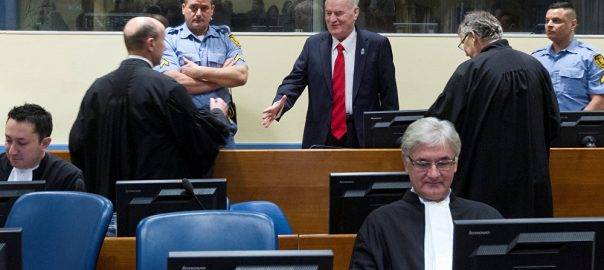UN war crimes court unveils last verdict in Bosnian Croat appeal
Shares

THE HAGUE: Six former Bosnian Croat political and military leaders will Wednesday learn their fate as UN judges hand down their final verdict for war crimes committed during the bloody break-up of Yugoslavia.
The appeals judgement in the case of Jadranko Prlic and five others will draw the curtain on two decades of work by the International Criminal Court of the former Yugoslavia (ICTY), set up in 1993 at the height of the Balkans wars to prosecute Europe’s worst atrocities since World War II.
It comes a week after the judges imposed a life sentence on former Bosnian Serb military commander Ratko Mladic, whose ruthlessness in the conflict earned him the title the “Butcher of Bosnia”.
Prlic, the former “prime minister” of a breakaway statelet, and his five co-defendants were found guilty in 2013 on 26 charges of taking part in a scheme to remove Bosnian Muslims “permanently and create a Croatian territory”, which included the southern city of Mostar besieged for nine months.
Prlic, 58, who led the “Croatian Republic of Herceg-Bosna”, has appealed his 25-year term imposed by the court in The Hague. While, the five others are also appealing long prison sentences ranging from 10 to 20 years.
The bloody 1992-1995 war in Bosnia, in which 100,000 people died and 2.2 million were displaced, mainly pitted Bosnian Muslims against Bosnian Serbs, but also saw some brutal fighting between Bosnian Muslims and Bosnian Croats after an initial alliance fell apart.
Massive crimes
The bald and bespectacled Prlic, who vehemently denied the charges, told the court in March his trial represented “a dark side of international justice”.
He said he “was not part of the chain of command” of the main Bosnian-Croat army in Bosnia, the HVO.
But Croatian communities needed to organise themselves, militarily as well, as the Bosnian Republic had not defended them.
The prosecution has also appealed the sentences, urging judges to impose 40-year terms on Prlic and three of his co-defendants, saying the “crimes were massive in scale”.
“Tens of thousands of Muslims were evicted from their homes… thousands were arrested and detained in awful conditions,” said prosecutor Barbara Goy.
“Muslims were killed during attacks or when forced to work on the front-lines. They were raped, they were sexually assaulted. Muslim houses and mosques were destroyed,” she said.
Mostar bridge
Prlic’s co-defendants are former defence minister Bruno Stojic, 62, and four other military officials: Slobodan Praljak, 72, Milivoj Petkovic, 68, Valentin Coric, 61, and Berislav Pusic, 65.
Praljak was specifically charged with ordering the destruction of Mostar’s 16th-century bridge in November 1993, which judges said “caused disproportionate damage to the Muslim civilian population”. The bridge was rebuilt in 2004.
The statelet, backed by government of Croatian nationalist leader Franjo Tudjman, was formally dismantled in 1996 as part of the peace deal that ended the war.
But the “president” of Herceg-Bosna, Mate Boban, died in 1997 and Tudjman in 1999, leaving Prlic the highest-ranking Bosnian Croat official to face judgement for the crimes.
After the war, Prlic went on to become Bosnia’s foreign minister from 1996 to 2001 and tried to present himself as a moderate, founding an unsuccessful pro-European party.
The ICTY charged him and his co-defendants in 2004. As Croatia came under pressure to comply with the court as part of the conditions for joining the European Union, the six surrendered and their trial opened two years later.
Wednesday’s verdict will mark the last time the ICTY judges will hand down a judgement with the court to close on December 31, having indicted and dealt with 161 people.
Appeals, such as for former Bosnian Serb leader Radovan Karadzic, sentenced last year to 40 years, will be dealt with a new tribunal known as the MICT in the same building in The Hague.
